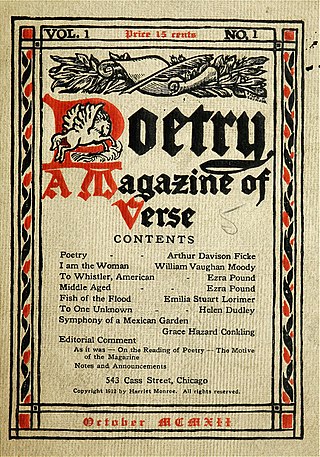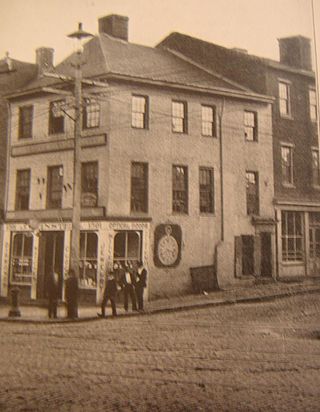Related Research Articles

Literary criticism is the study, a genre of arts criticism, evaluation, and interpretation of literature. Modern literary criticism is often influenced by literary theory, which is the philosophical discussion of literature's goals and methods. Although the two activities are closely related, literary critics are not always, and have not always been, theorists.

Henri Barbusse was a French novelist, short story writer, journalist, poet and political activist. He began his literary career in the 1890s as a Symbolist poet and continued as a neo-Naturalist novelist; in 1916, he published Under Fire, a novel about the World War I based on his experience which is described as one of the earliest works of the Lost Generation movement or as the work which started it; the novel had a major impact on the later writers of the movement, namely on Ernest Hemingway and Erich Maria Remarque. Barbusse is considered as one of the important French writers of 1910–1939 who mingled the war memories with moral and political meditations.

Partisan Review (PR) was a left-wing small-circulation quarterly "little magazine" dealing with literature, politics, and cultural commentary published in New York City. The magazine was launched in 1934 by the Communist Party USA–affiliated John Reed Club of New York and was initially part of the Communist political orbit. Growing disaffection on the part of PR's primary editors began to make itself felt, and the magazine abruptly suspended publication in the fall of 1936. When the magazine reemerged late in 1937, it came with additional editors and new writers who advanced a political line deeply critical of Joseph Stalin's Soviet Union.

Rudolf John Frederick Lehmann was an English poet and man of letters. He founded the periodicals New Writing and The London Magazine, and the publishing house of John Lehmann Limited.
Nicholas Moore was an English poet, associated with the New Apocalyptics in the 1940s, whose reputation stood as high as Dylan Thomas’s. He later dropped out of the literary world.
John Edgell Rickword, MC was an English poet, critic, journalist and literary editor. He became one of the leading communist intellectuals active in the 1930s.

Thomas Henry Wintringham was a British soldier, military historian, journalist, poet, Marxist, politician and author. He was a supporter of the Home Guard during the Second World War and was one of the founders of the Common Wealth Party.
Randall Carline Swingler MM was an English poet, writing extensively in the 1930s in the communist interest.

A literary magazine is a periodical devoted to literature in a broad sense. Literary magazines usually publish short stories, poetry, and essays, along with literary criticism, book reviews, biographical profiles of authors, interviews and letters. Literary magazines are often called literary journals, or little magazines, terms intended to contrast them with larger, commercial magazines.
The Left Book Club was a publishing group that exerted a strong left-wing influence in Great Britain from 1936 to 1948.

The Southern Literary Messenger was a periodical published in Richmond, Virginia, from August 1834 to June 1864, and from 1939 to 1945. Each issue carried a subtitle of "Devoted to Every Department of Literature and the Fine Arts" or some variation thereof and included poetry, fiction, nonfiction, reviews, and historical notes. It was founded by Thomas Willis White, who served as publisher and occasional editor until his death, in 1843.

The Egoist was a London literary magazine published from 1914 to 1919, during which time it published important early modernist poetry and fiction. In its manifesto, it claimed to "recognise no taboos", and published a number of controversial works, such as parts of Ulysses. Today, it is considered "England's most important Modernist periodical."
Dwight Macdonald was an American writer, editor, film critic, social critic, literary critic, philosopher, and activist. Macdonald was a member of the New York Intellectuals and editor of their leftist magazine Partisan Review for six years. He also contributed to other New York publications including Time, The New Yorker, The New York Review of Books, and Politics, a journal which he founded in 1944.

New Masses (1926–1948) was an American Marxist magazine closely associated with the Communist Party USA. It succeeded both The Masses (1912–1917) and The Liberator (1918-1924). New Masses was later merged into Masses & Mainstream (1948–1963). With the coming of the Great Depression in 1929 America became more receptive to ideas from the political Left and New Masses became highly influential in intellectual circles. The magazine has been called “the principal organ of the American cultural left from 1926 onwards."
The Tamarack Review was a Canadian literary magazine, published from 1956 to 1982. Established and edited by Robert Weaver, other figures associated with the magazine's editorial staff included Anne Wilkinson, William Toye and John Robert Colombo. In addition, Ivon Maclean Owen was among the founding editors. During the early years of the magazine, there was also an editorial advisory board made up of F.R. Scott, A.J.M. Smith, James Reaney, Alan Crawley, and George Woodcock. The magazine was published on a quarterly basis and had its headquarters in Toronto.
Maurice Richardson (1907–1978) was an English journalist and short story writer.
New Writing was a popular literary periodical in book format founded in 1936 by John Lehmann and committed to anti-fascism.
The American Review was a magazine of politics and literature established by the fascist publisher Seward Collins in 1933. There were 71 issues published, containing articles, editorials, notes, and reviews, before the journal ceased operations in October 1937.

Ann Lorraine Davies known as Ann Lindsay was a British actress and translator.
Peter Thomas Barry FEA, FLSW is a British writer and academic.
References
- ↑ Murphy, J.F. The Proletarian Moment: The Controversy over Leftism in Literature, Chicago: Un. of Illinois Press, 1991
- 1 2 3 4 Craig Werner, "Left Review and Left Literary Theory" in British literary magazines. Westport, Conn. : Greenwood Press, 1983-1986. Volume Four. ISBN 0-313-22871-X
- 1 2 James Smith, British Writers and MI5 Surveillance, 1930-1960. Cambridge Cambridge University Press, 2012 ISBN 1-107-03082-X (pp. 2–3).
- 1 2 "The role of writers in British society". The Open University.
- ↑ Christa Knellwolf; Glyn P. Norton; Christopher (2001). The Cambridge History of Literary Criticism . Cambridge University Press. p. 158. ISBN 0-521-30014-2.
- ↑ Adrian Caesar, Dividing Lines: Poetry, Class, and Ideology in the 1930s Cultural Politics Manchester University Press, 1991. ISBN 0-7190-3376-4 (p. 203).
- ↑ Margot Heinemann, "Left Review, New Writing and the broad alliance against Fascism", in Edward Timms and Peter Collier, Visions and Blueprints: Avant-garde Culture and Radical Politics in Early Twentieth-century Europe Manchester University Press, 1988. ISBN 0-7190-2261-4 (pp. 118–9)
- ↑ Dave Arthur, Bert: The Life and Times of A. L. Lloyd. London: Pluto Press, 2012, ISBN 978-0-7453-3252-9. (pp. 52-3)
- ↑ Richard C. S. Trahair; Robert L. Miller, eds. (2012). Encyclopedia of Cold War Espionage, Spies, and Secret Operations. New York: Enigma Books. p. 37. ISBN 978-1-929631-75-9.
- ↑ Smith, 2012 (pp. 35–6).
- 1 2 Michael Woodhouse, Brian Pearce (editors), Essays on the history of Communism in Britain. New Park Publications, 1975 ISBN 0-902030-77-9, (p. 235).